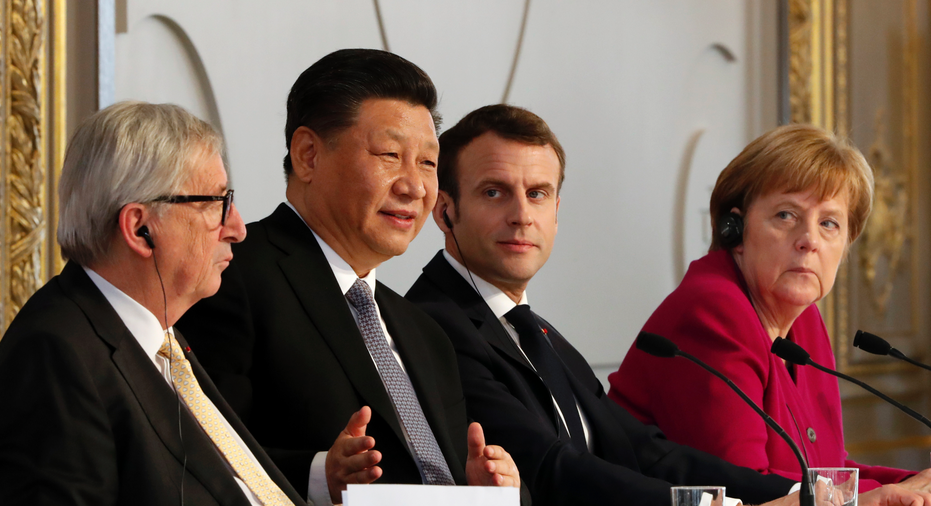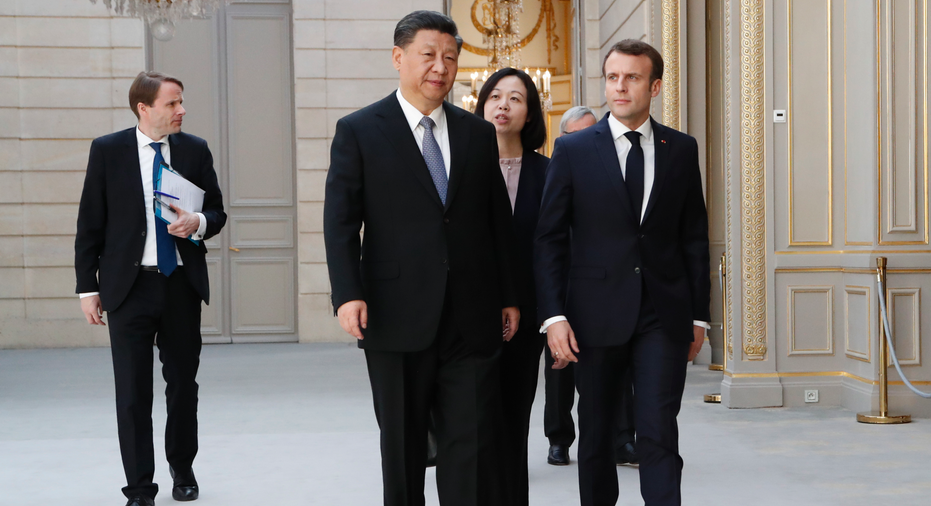China's Xi, European leaders form trade policy partnership
French President Emmanuel Macron, 2nd right, Chinese President Xi Jinping, German Chancellor Angela Merkel and European Commission President Jean-Claude Juncker, left, hold a press conference at the Elysee presidential palace in Paris, Tuesday, March 26, 2019. Xi Jinping is meeting with the leaders of France, Germany and the European Commission, as European countries seek to boost relations with China while also putting pressure over its trade practices. (AP Photo/Thibault Camus, Pool)
PARIS – Chinese President Xi Jinping agreed Monday to work with European leaders to seek fairer international trade rules and to address the world's economic and security challenges, establishing "a trust-based partnership" that seemed like a rebuke to Donald Trump's protectionist policies.
Xi, who is on a state visit to France, met in Paris with French President Emmanuel Macron, German Chancellor Angela Merkel and European Commission President Jean-Claude Juncker to discuss relations between China and Europe.
Macron acknowledged "existing rivalries" between the European Union and China over economic policies, but the four said in a joint statement after the meeting they committed to seeking "a trust-based partnership."
"I think our common goal is to make sure the response to these tensions doesn't cause fractures in the international commercial order, fresh trade conflicts or isolationist policies," Macron said in the statement. a joint statement following the meeting.
Xi said reformed governance rules should address worldwide challenges like climate change, cybersecurity and mass migration.
"Competition and international frictions keep growing" in the world, he said.
Amid trade tensions between the United States and both China and the European Union, European countries want to boost relations with China while also applying pressure over its business practices.
China wants to play a bigger role in international organizations like the United Nations, the World Trade Organization and the International Monetary Fund that were created under a Western-based model.
The leaders are preparing for a EU-China summit on April 9. The EU is China's biggest trade partner and wants to solidify that relationship.
European Union chief Juncker said "European companies will need to find the same level of openness when it comes to their access to China's internal market as the one Chinese companies find in Europe: a level of total openness."
Juncker also said Europe should get a concerted approach toward the Belt and Road Initiative, China's vast infrastructure project to link China with Africa, Europe and beyond.
The EU is worried about unfair competition from Chinese companies. Juncker said the bloc should defends its interests and "take advantage of the opportunities" opened under that project.
"I would like for these investments to be not just Chinese but also benefit Europeans and transit countries," he said.
Merkel said that "with multilateralism it's possible to get a win-win approach." She suggested the United States should be part of the multilateral decision-making process, instead of squaring off with China over trade and other issues.
U.N. Secretary-General Antonio Guterres backed Tuesday's meeting, stressing in a letter the need for "an international order based on common rules."
Separately, Xi and Macron issued a sweeping, 37-point joint statement that seemed like another rebuke to Trump.
It vaunted the importance of multilateralism in just about every domain, from preventing nuclear war to reducing dangerous greenhouse gas emissions.
They reiterated their commitment to the Iran nuclear accord that Trump has rejected. They also defended the United Nations and other international institutions that Trump has described as ineffective and inconsistent with his "America First" agenda.
Tuesday's meeting was the last scheduled event in Xi's European visit that started last week and included stops in Italy and Monaco.
His trip coincided with the signing of large business contracts, including a deal with China that represents one of largest sales ever for European aircraft maker Airbus.
____
Angela Charlton contributed to the story





















